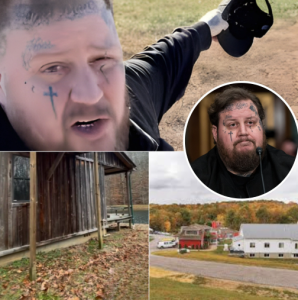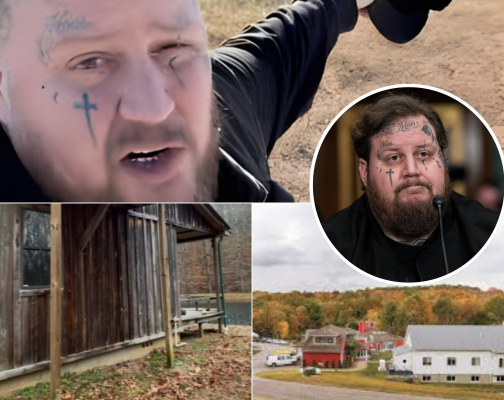
Jelly Roll



Jelly Roll (born Jason Bradley DeFord) has become much more than a chart-topping musician—he’s crafting a vision of redemption and service that draws directly on the darkest chapters of his life, and now he’s determined to turn his Tennessee property into a physical sanctuary for those battling addiction, trauma and broken hearts. Here’s a closer look at the story behind this bold undertaking.
From the past to the soil beneath his boots
Jelly Roll’s life hasn’t followed a typical path. Raised in Antioch, Tennessee, and caught up in street life from a young age, he faced repeated legal troubles, substance abuse, and a sense of being adrift His transformation—shifting from outlaw to artist, from desperation to hope—is central to what he wants to build.
It’s especially significant that he’s doing it on his own land in Tennessee. He once described riding his four-wheeler across the property and discovering “there are so many areas of his land that he’s yet to explore” — but more than that, he sees the land as a place to reclaim what once held him down. The soil, the creek, the acreage—they’re not just real estate—they’re metaphors: this is ground where his “darkest days” once rook place, now to be reset as ground for healing.
The Vision: A 100-acre free rehabilitation & mental-health campus
In October 2025, Jelly Roll publicly revealed his plan: to build on a 100-acre tract of his Tennessee land a free rehabilitation and mental-health campus for addicts, hurting hearts, the “poor kids, like we’re just f***ing down” he said. Some of the key elements of the plan:
-
It will be free of charge — no cost to the residents in treatment.
-
The programming will include a traditional 28-day, 12-step-style track and more intensive mental-health/therapy/holistic tracks.
-
It will be immersive: he envisions “guest weekenders” who don’t just speak from outside, but “leave their phones and get in the trenches with the guys” — mudding, hands-on, community building.
-
He wants to use the resources he now has—his platform, his property, his awareness—to build the kind of help he never had when things were at their worst.
By anchoring the campus on his land, he’s tying his past, present, and purpose into a cohesive whole: this isn’t a side charity—it’s his story, his redemption, his land, his legacy.
Why this matters
There are multiple layers of meaning here:
Personal redemption: For Jelly Roll, this is a full-circle move. The same state, the same region where he once floundered is now where he intends to sow hope. By turning the land where his darkest hours may have been into a place of healing, it symbolizes his own transformation. He’s not just sharing his story; he’s building from it.
Community impact: Addiction and mental-health crises are rampant, and access to free or low-cost treatment remains a critical barrier. A 100-acre campus dedicated to recovery that’s free of charge is rare. His emphasis on holistic care and immersive environment speaks directly to people who often fall through the cracks. As one news outlet put it: “a lifeline … completely free of charge.” Real Country 103.5
Authenticity: Because he’s lived the struggle and come out on the other side, his credibility matters. When he says “people like us … when life was kicking our a**,” it resonates in a way that many well-meaning but detached philanthropists cannot match. The rawness of his message is part of what gives it power.
Symbolic geography: Building on his land in Tennessee is not incidental—it speaks to reclaiming ground. The creek divides part of the property, and he pointed to land “on the other side of the creek” as the development site. Whiskey Riff+1 That physical geography becomes metaphorical: crossing from one side of life to another. The property isn’t just land—it’s a threshold.
Challenges & what’s next
Of course, the plan is ambitious, and there are many moving parts:
-
Timeline: While the vision is clear, there isn’t yet a public detailed timeline or full blueprint. Several sources indicate “no official timeline yet” for full operation. Taste of Country+1
-
Implementation: Running a rehab campus—especially one free of charge—is complex. You need licensed staff, facilities, ongoing funding, program design, regulatory approvals. The fact that he mentions “Miles and them will do all the programming” suggests he is assembling a team. Country 102.5
-
Sustainability: Free services mean funding and ongoing support must be secured. His brand and platform may drive initial capital, but long-term operations will need reliable streams (grants, donations, partnerships) to maintain quality and viability.
-
Scope: He wants to serve people who’ve had little access, who are “down bad.” That means dealing with complex trauma, perhaps co-occurring mental health issues, and long-term recovery rather than quick fixes. The holistic model suggests he’s aware of that, but scaling it well will matter.
-
Integration with community: The site being on his private property is powerful, but there may be zoning, regulatory, local community considerations. Integrating recovery services with local mental-health systems can amplify impact but also adds layers.
Why it could be a game-changer
If executed well, this campus could serve as a new model of artist-driven philanthropy, where a public figure leverages personal experience and private property to create something tangible and long-lasting. Some reasons:
-
Authentic anchor: Many recovery programs struggle with trust or authenticity. Having someone who’s walked the path and speaks plainly may attract people who otherwise might avoid treatment.
-
Immersive environment: The idea of “get in the trenches” and “mud with the boys” suggests experiential therapy, community, nature elements—these are often under-utilised in standard institutional settings.
-
Free access: Cost is a major barrier. By eliminating it, the campus opens doors to people who might have given up hope simply due to finances.
-
Visibility: Because Jelly Roll is a recognized artist, the project brings visibility to the broader issues of addiction and mental-health in rural or semi-rural America—helping de-stigmatize help-seeking.
-
Full-circle narrative: The imagery of turning one’s own land from semi-wilderness (riding four-wheelers, discovering parts of it) to wild-kind, healing ground is powerful. It’s not just a building—it’s a transformation of place and identity.
A few closing reflections
When we talk about “healing hearts” and “helping addicts,” too often those phrases remain abstract. What Jelly Roll is proposing is concrete: physical land, facilities, programs, a defined vision. And rooted in the soil where he once struggled—which gives both poetic weight and real-world grounding.
He has said:
“And now think about the resources that we have, that could have helped us so much in those moments.” Whiskey Riff+1
That line nails the heart of it: he isn’t just saying “I want to give back.” He’s saying “I want to build the help I never had, at the moment I needed it most.” That’s a different level of commitment.
If you like, I can pull together more of his quotes, visuals of the property, and potential timeline/details of the project so you get the full immersive picture. Would you like me to dig in on that?

